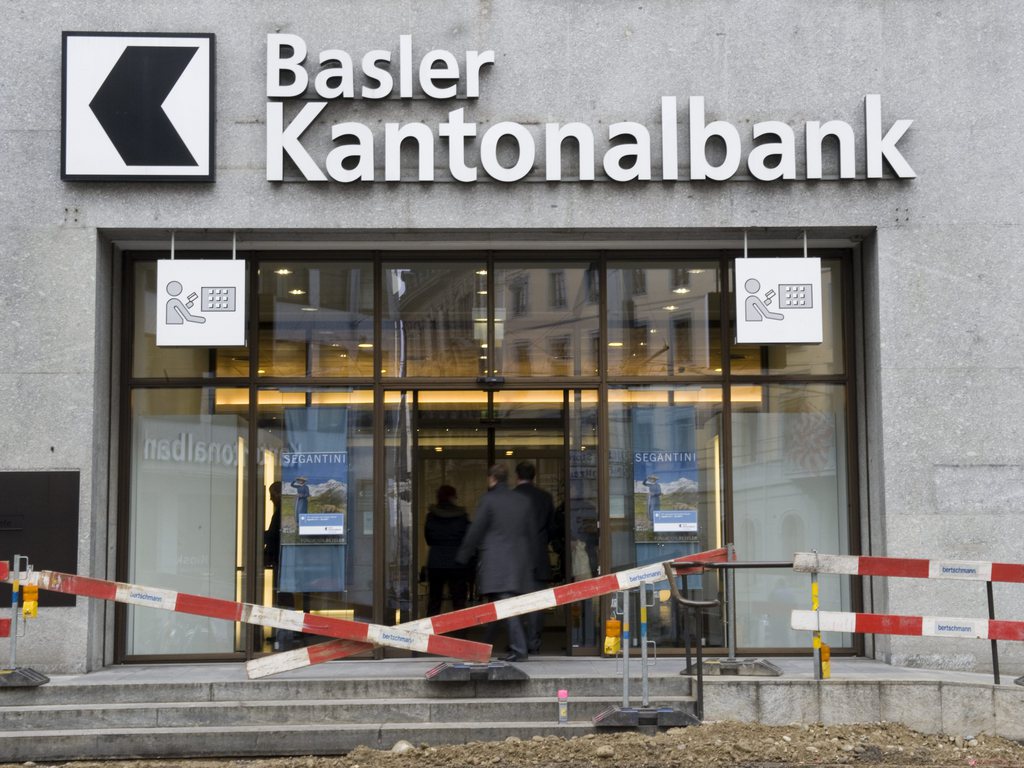US tax net closes on local lenders

At least two state-backed cantonal banks feature among the group of Swiss institutions in the crosshairs of the US Justice Department for allegedly helping American tax dodgers. Critics say their state guarantees should be removed.
“New capital for expansion, targeted foreign markets, private banking for the super-rich, and bonus programmes for top managers and other staff. The Zurich cantonal bank is certainly doing its utmost to become a major player,” wrote the Neue Zürcher Zeitung newspaper earlier this year describing the ambitions of Switzerland’s largest cantonal bank.
Today this article stands in stark contrast to recent political and legal developments.
The Zurich and Basel cantonal banks are among at least 14 Swiss financial institutions currently under investigation by the US Justice Department, suspected of helping US citizens evade taxes.
Some of these illegal activities allegedly took place after 2009 when the country’s biggest bank UBS was forced to pay a fine of $780 million and deliver the names of more than 4,500 clients to avoid indictment over tax-dodging allegations.
For the past few months suspicions have been mounting that other cantonal banks are in the US firing line.
The Basel Cantonal Bank itself has rejected all accusations of facilitating US tax dodgers. In a written reply to swissinfo.ch the bank explained that it had not accepted any new US residents as clients since the end of March 2009.
American clients who had had accounts with UBS and subsequently approached the Basel bank were ‘mostly clients who wanted to place their declared assets in a bank that offered [state-backed] security,’ the bank declared.
‘Past relic’
Apart from the Geneva, Vaud (partial state guarantee) and Bern (no state guarantee) cantonal banks, which were recapitalised to the tune of billions of Swiss francs by taxpayers following the real estate crash at the start of the 1990s, all Swiss cantonal banks enjoy unlimited state guarantees.
This means that an investor can be certain their assets will be fully reimbursed if the bank goes bust, a practice many experts denounce.
“It’s a relic from the past that no longer has its place in the modern vision of a global bank,” said Geneva lawyer Carlo Lombardini.
Zurich University professor Hans Geiger concurred, writing in Le Temps newspaper in 2011 that “this guarantee poses problems as cantonal banks expand abroad, since offering wealth management services to foreign clients is not a public service”.
For Lombardini such last-resort state-backed guarantees are even dangerous: “Because the canton has the reputation of being a solid credit-worthy stakeholder, the cantonal bank may be increasingly tempted to go off on risky adventures,” he added.
The Zurich and Basel cantonal banks are not the only ones to be tempted by foreign expansion.
The Geneva cantonal bank has branches in Dubai and Hong-Kong. A bank spokesman told swissinfo.ch that this is mainly for Geneva clients who want to make investments abroad.
“We are not embroiled in the US tax problems and there is no reason that we should be in the future given our clientele,” the spokesman noted, adding however that “no Swiss bank apart from the small regional banks can totally exclude this possibility”.
There are 24 cantonal banks in Switzerland, i.e. one for every canton, with the exception of Solothurn and Appenzell Outer Rhodes. The cantons either own the bank outright or are the majority stakeholder.
Cantonal banks were founded in the second half of the 19th century. Historically, the role of these banks was to strengthen and support the local economy through the provision of low-cost loans.
Today they offer an extensive range of products and services. Their main areas of business are loans to small and medium-sized companies and retail banking, particularly mortgages. They have large market shares in these sectors, and many of them are market leaders in their region. Recently, cantonal banks have also made a name for themselves in the investment sector.
They directly compete with other banks and banking groups, and are subject to the same banking regulations as all other Swiss banks. They operate mostly in Switzerland (over 90 %, taking the group as a whole). They account for approximately 30 % of the total assets of all Swiss-domiciled banks, and the market share of their domestic operations is about one third, depending on the business area. Together they employ nearly 19’000 people.
‘Competitive distortion’
In an interview in Le Temps, the Zurich professor Martin Janssen lumped all Swiss banks together in one basket.
“Whether it’s the two big banks, UBS or Credit Suisse, PostFinance or the cantonal banks, the problem remains the same. These institutions pay nothing to the state for its direct or indirect support…as to the cantonal banks, the state should slowly withdraw,” he commented.
This withdrawal, according to Janssen, could lead to mergers which in the long run may result in only two or three Swiss cantonal banks remaining.
Various politicians have also raised concerns about the cantonal banks’ actions and called into question state guarantees for banks.
Centre-right Christian Democrat parliamentarian Dominique de Buman talked about a“distortion of competition” during a debate on Swiss public television. In Zurich the centre-right Radical Party went further, claiming that “state guarantees in their current form have no future.”
Some Zurich and Basel politicians are also calling for limits to be put on guarantees for clients residing in the cantons and for certain types of activity.
Still useful
However, a number of experts still believe in the usefulness of cantonal banks and the need for the state to be the lender of last resort.
“Admittedly state guarantees should not be valid in the case of foreign activities. But in a decentralised democratic system it’s essential to have financial leverage available such as cantonal banks to support local policies,” said Olivier Crevoisier, an economics professor at Neuchâtel University. “And with the failure of the international finance system I’m certain that these local strategies will become popular in the coming years.”
The St Gallen cantonal bank has just taken a step in this direction, announcing recently that it was selling off part of its private banking branch Hyposwiss to focus on its local market in eastern Switzerland and Germany.
To justify this move the institution highlighted “changing conditions in the wealth management business” and “increased regulations”.
“This focusing also reduces business risks,” said the bank, while denying the US tax dispute had influenced its decision.
(Translated from French by Simon Bradley)

In compliance with the JTI standards
More: SWI swissinfo.ch certified by the Journalism Trust Initiative


You can find an overview of ongoing debates with our journalists here . Please join us!
If you want to start a conversation about a topic raised in this article or want to report factual errors, email us at english@swissinfo.ch.